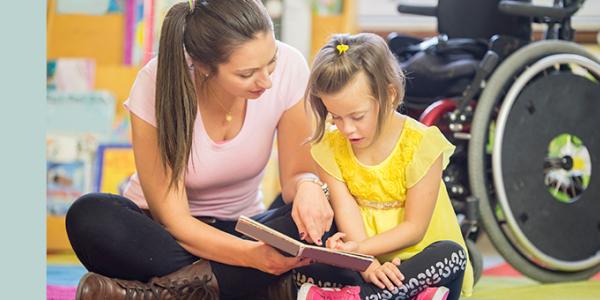Books Plus Time Equals Happiness

You are here
By Mary Reid
“Reading to your children gives them a lifetime of happiness,” says Elizabeth, my 23-year-old daughter, an avid reader.
When our two children were preschool age, their father’s career required him to be away from home until evening almost every day. By the time he made it home just before dinner, I was ready for some assistance. Every night after dinner he took charge of the kids for 45 minutes. They all piled onto our big bed with lots of pillows, the children’s favorite stuffed animals, and a stack of books. He started reading to them before they could walk and continued until they were in second and fourth grade, respectively. There’s no telling how many books he read or how many times he reread their favorites. As the children matured, he began reading chapter books in nightly installments.
I don’t know about that promised lifetime of happiness, but as a pre-K teacher I now know how important it is to read to young children. I attribute much of my children’s academic success to the hours their father gave to reading aloud to them.
Reading to a young child is important for several reasons:
- It builds your relationship with the child. There’s always something to talk about—the characters, the action, how it makes you feel and why. And all the language you share in conversation is an amazing learning experience for the child
- It teaches rhythm. Children need exposure to the rhythm of language. What better way to teach it than with a silly book like Who Stole the Cookies From the Cookie Jar?
- It teaches rhyme, another essential skill when learning to read. Read nursery rhymes aloud and repeat them often with your child. “Little Boy Blue” and “Mary Had a Little Lamb” should be on your reading list as well as other old favorites.
- It strengthens focus and attention span. If you say, “My 3-year-old won’t sit and listen to a book,” try a wordless book with bright, colorful photos that interest her (e.g., dogs, trucks, butterflies). Focused attention is a necessary skill for later learning.
- It teaches new vocabulary. When you read books like Is Your Mama a Llama?, by Deborah Guarino, animal names and their babies’ names become a natural part of the conversation. Did you know a baby llama is called a cria? Your 3-year-old may even recognize the names of some animals when your play group visits the zoo.
When you read with your child, you cozy up with him and a good book because it’s fun. The time spent together is irreplaceable. No, you don’t set out to teach your child when you read to him. But it happens.
And maybe you’ll also give your child a lifetime of happiness.
Mary Reid taught Pre-K and Kindergarten for 11 years in the public school system in Villa Rica, GA. In the fall of 2015, she began a new adventure teaching pre-service teachers at the University of West Georgia in Carrollton, GA.